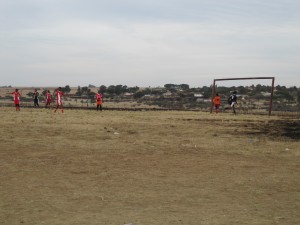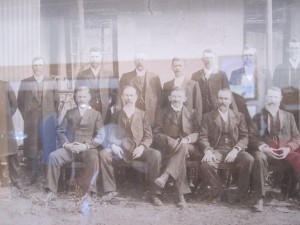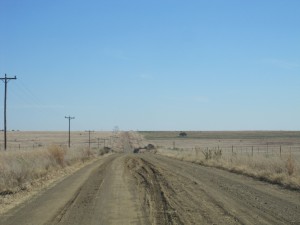Ficksrus, Free State South Africa June 16th 2011
 It is clear and cold with a bright winter sun on Soweto Day, a public holiday in South Africa that celebrates the 1976 Soweto riots, and I am marking it by watching a little league soccer game in the township of Matlwangtlwang in the flat plains of the Free State. Two youth teams are playing—New Castle vs Marabelle, both local sides, the latter coached by my contractor and friend, Letatsi. It is a fairly ordinary scene really. Both sides have bright team jerseys and are playing on a dusty uneven field without markings or any bleachers, surounded on one side by small but neat brick homes and, on the other, by the informal section of the settlement—tin shacks of varying degrees of squalor. In the near distance and physcially removed from the township under the old apartheid geography is Matlwangtlwang’s twin city of Ficksrus—the latter still, largely, the white town, with its tall sandstone Church steeple and now faded main street.
It is clear and cold with a bright winter sun on Soweto Day, a public holiday in South Africa that celebrates the 1976 Soweto riots, and I am marking it by watching a little league soccer game in the township of Matlwangtlwang in the flat plains of the Free State. Two youth teams are playing—New Castle vs Marabelle, both local sides, the latter coached by my contractor and friend, Letatsi. It is a fairly ordinary scene really. Both sides have bright team jerseys and are playing on a dusty uneven field without markings or any bleachers, surounded on one side by small but neat brick homes and, on the other, by the informal section of the settlement—tin shacks of varying degrees of squalor. In the near distance and physcially removed from the township under the old apartheid geography is Matlwangtlwang’s twin city of Ficksrus—the latter still, largely, the white town, with its tall sandstone Church steeple and now faded main street.
I’m the only white guy here today but my presence is unremarkable and largely unnoticed or ignored, for which I am grateful. In fact the whole scene is fairly unremarkable—a league match on a public holiday attended by a small crowd. This normality is a bigger achievement than it sounds.
The Soweto riots were a turning point in South African history—this was the day blacks stood up against the apartheid government. There had been other, scattered, protests, including a massacre of largely peaceful protestors by police at Sharpeville in 1961, but the Soweto riots were essentially the start of an insurrection that made large parts of the country—its black townships—ungovernable for the next 18 years, hastening the end of minority rule. That was not completely apparent in 1976 when the government of the day seemed to believe that the 1000 year Reich of apartheid could continue indefinitely. It was confident enough that it changed the language of education for Africans from English to Afrikaans, the language of the oppressor. It was a thoughtless provocation and the minister of the day is on record saying:
“I have not consulted the Africans on this issue and I do not intend to either”.
The government was ultimately made to eat those words and withdraw the proposed change. The rest, of course, is history. After years of bitter conflict liberation was achieved. But at a cost—a generation was lost, with schools burned and education crippled, a society brutalised from having fought the army and police, burned traitors—and alleged traitors—to death in the streets. South Africa remains a violent society.
Now, 17 years after liberation is South Africa, which experienced the traumas of apartheid and a racially conflicted 300 year history, just another normal, or near normal, country? On the surface people do, indeed, get along, and for the most part there is good will. But the South Africa of today also feels like a country on the downswing, the early and easy gains of the beautiful and inspiring Nelson Mandela era fading, and entering a much harder and more conflictual period of unfinished business and score settling. More radical, racially-charged, political rhetoric is coming to the fore—demands for natonalisation, the seizure of land without compensation and openly punitive racial policies, things confined to the margins even five years ago, are now an open part of the political landscape.
The grass roots are more restive, whites are more fearful. Despite the economic gains that have uplifted many and have proceeded as quickly as can reasonably be expected, most black people remain very poor and the economy is not absorbing new-comers into the labour market. Unemployment is extremely high for a developing country.
It does not take sophisticated measurement to see these contrasts. Shops, business, and homes are mostly in minority hands. Whites still have the skills and the resources in this country, even as the government moves as quickly as it can with its controversial “transformation” and “empowerment” policies, which to some extent have morphed into political short hand for a take-over by cronies and supporters of the ruling party in whose hands public services have collapsed and corruption thrived. Among whites the main source of grievance is not black rule, it is the sense of decline and dysfunction—the deterioration of state services and the affirmative action programmes that all private businesses must work with, which have facilitated entitlement and closed the door to highly skilled people of the wrong colour who are leaving the country, even as it experiences a massive skills gap. For other people, however, the issue is not that transformation is proceeding too fast, it is that it hasn’t gone nearly far enough.
The writer George Eliot’s books on 19th century rural England indicated small towns and the countryside to be microcosms that bring the social and other cleavages of a country more clearly into view. South Africa’s Free State—which can look like Kansas or southern Alberta—has all these attributes; you cannot lose oneself in the anonymity, comfort and cosmopolitanism of big city South Africa here, you live at the sharper edges of a sharp edged country. People do mix and get along, but there are tensions under the surface and the contrasts are starker. The rural Free State is poor. Farming is the main business and most farmland is owned by white people. Blacks live in islands, surrounded by vast expanses of seemingly empty farmland.
Whites live in fear, essentially. A slow gnawing existential anxiety that the other shoe will drop eventually, that they could lose everything if the politics turn wrong and the political settlement that ended minority rule and in which they have trusted will fall apart. More immediately there is the fear of a violent death—farm murders are common. An awareness of security and that this rests with the people with whom you work and see around you is a voiced and unvoiced concern for anyone who chooses to live here.
After a month and a half I have got to know this area and been made welcome by the people for whom it is the centre of their world. It is a privilege, and an honour, really, to be accepted into such a community that is otherwise hard to access and is far more remarkable than realised.
 Afrikaners are one side of this world and it is easy to see historical continuity for this tough, resourceful often misrepresented people with their unique past and attachment to land and country. The dominant themes of Afrikaner history are struggles for autonomy and survival while accommodating larger and more powerful forces in the same land—whether the British Empire, the black majority or, more commonly, poverty. Despite current discontent and nostalgia for the past and lost nationhood—the golden era in Afrikaner historical consciousness are their independent republics of the 19th century which were extinguished by the 1899-1902 Anglo Boer War—there has never been any ideal time, only different sets of risks and adversity.
Afrikaners are one side of this world and it is easy to see historical continuity for this tough, resourceful often misrepresented people with their unique past and attachment to land and country. The dominant themes of Afrikaner history are struggles for autonomy and survival while accommodating larger and more powerful forces in the same land—whether the British Empire, the black majority or, more commonly, poverty. Despite current discontent and nostalgia for the past and lost nationhood—the golden era in Afrikaner historical consciousness are their independent republics of the 19th century which were extinguished by the 1899-1902 Anglo Boer War—there has never been any ideal time, only different sets of risks and adversity.
The Africans who I work with and have got to know are the other occupants of this world into itself and I have listened, been patient and accepted the rewards of their slow confidences, aware that there are things likely left unsaid. As a foreigner I am a neutral party for both. Otherwise their acceptance and friendship is something for which I am infinitely grateful.
I am renovating a derelict house in a remote corner of a farm property, my future home, and there is a new person on my work crew this week. Ezekiel is young—23—and hoping to study human resource management at college, if he can raise the money for tuition. Home is a shack on a nearby white farm where his Mother lives, as a dependent of the white farmer. What does he think of things in this area?
“The other people here are not like you. They have so much and we have so little. Yes, we’ve seen progress since freedom came, but not much changed also. Maybe one day we will live like Kings also?”
It is a cold winter day and the wind swept Free State can feel and look as desolate as the great plains of North America. One of the farm wives comes into the shop where I am, at the game’s half time.
A man walked past our farm today—he was so sick and awful looking that it scared me, his face was grey as though he had just come from Hell. But later I recognised him—he had worked for us a year ago. He had come and asked for work and we got him to do something in the garden for a few weeks. I remember that one day his wife came to my door and said, ‘please madam, do you have some food. I am so hungry that I think I will die’. I asked why he would not feed his own family but he grumbled about having other things to pay for.
 He didn’t stay with us long. I try to help people if they come and ask for work but it is risky because you don’t know who they are, really, and if you accept someone on your farm then they know you and where you live. The memory of that man has stuck with me. I asked our farm workers about him and they said he had just been released from jail—there is a big prison nearby, 50km away. He looked very unhealthy, with his face swollen as though he’d been beaten in prison, or was ill and had an infection. No one will hire him that way. And I can’t either. People that desperate will murder you.
He didn’t stay with us long. I try to help people if they come and ask for work but it is risky because you don’t know who they are, really, and if you accept someone on your farm then they know you and where you live. The memory of that man has stuck with me. I asked our farm workers about him and they said he had just been released from jail—there is a big prison nearby, 50km away. He looked very unhealthy, with his face swollen as though he’d been beaten in prison, or was ill and had an infection. No one will hire him that way. And I can’t either. People that desperate will murder you.
Back on the soccer pitch in Makwang, the game is ending. Marabelle has drawn the match and will play the next team in a four sided tournament for Soweto Day. Letatsi calls his players into a circle and is delivering a critique of their match performance. The quiet drive of this man and his innate decency is something to admire.
